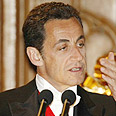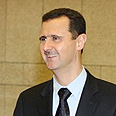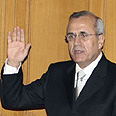


French president visits Lebanon to show of support for country's peace efforts
Sarkozy meets with President Suleiman and representatives of main 14 Lebanese political factions, including Hizbullah delegates, calls for called for 'sincere dialogue between the Lebanese on a national defense strategy'. Aide says French leader to send two envoys to Damascus
French President Nicolas Sarkozy pledged strong support for Lebanon's new president and urged feuding factions to engage in dialogue Saturday during a one-day visit to the country.
Sarkozy is the first Western head of state to meet President Michel Suleiman since the former army chief was elected as compromise president on May 25. The election was part of an agreement signed in Qatar last month to end an 18-month political crisis that had pushed Lebanon to the brink of civil war.
Sarkozy arrived from Athens and was received at Beirut airport by Suleiman, Prime Minister Fouad Saniora and Parliament Speaker Nabih Berri. His office has described the visit as an "unprecedented" effort to show French support for the Lebanese people.
The French president was accompanied by Prime Minister Francois Fillon and Foreign Minister Bernard Kouchner, but the three arrived in separate planes apparently for security reasons. He is also accompanied by the heads of all France's main political parties.
Lebanese army cannons fired 21 shots to salute Sarkozy as he descended from the plane to a red carpet welcome. A brass band played the Lebanese and French national anthems.
In brief comments at the airport, Sarkozy said Suleiman's election was "a synonym for hope" for all the Lebanese and called on leaders to follow through on commitments made in Qatar.
He also pledged French and European support. "Mr. President, dear Michel, you know you can count on the engagement of France, political engagement and economic engagement," Sarkozy said.
"President Suleiman has a big responsibility to achieve national reconciliation... There has been too much suffering in Lebanon," he added.
Suleiman and Sarkozy's convoys drove through streets decorated with the French and Lebanese flags to the suburban presidential palace in Baabda as army helicopters flew overhead.
Sarkozy then held a closed meeting with Suleiman before meeting with representatives of the main 14 Lebanese political factions, including delegates of the militant Hizbullah group, at a lunch at the presidential palace.
France, a former colonial power with strong ties to Lebanon, hosted representatives of the 14 groups at a conference last year meant to encourage dialogue between them, but the meeting did not achieve any results. Kouchner had made several trips to Lebanon to try and bring Lebanon's rival leaders together.
Speaking at the presidential palace flanked by Suleiman, Sarkozy later called for a "sincere dialogue between the Lebanese on a national defense strategy, which can longer be deferred."
'Trip exclusively political'
The parliamentary majority has repeatedly called for a defense strategy that would eventually integrate Hizbullah's weapons into the national army. Hizbullah has resisted the calls and balked at a requirement to disarm included in the UN Resolution that ended a month long war between Israel and the militant group in 2006.
Sarkozy later gave a speech to members of the French community at the Pine Palace, which is the residence of the French ambassador, before wrapping up his five-hour visit in the afternoon.
Outside the airport, about three dozen people gathered for a sit-in to demand the release of a Lebanese citizen serving a life sentence in France. Georges Ibrahim Abdallah was convicted in 1987 of complicity in the 1982 killings in France of a US and an Israeli diplomat and in the attempted murder of another American diplomat.
In comments to three local Lebanese newspapers on the eve of his visit, Sarkozy said "France is the friend of all Lebanese without exception." He described the agreement reached in Qatar as "a victory for dialogue against violence."
Sarkozy's visit is the first by a French head of state to Lebanon since the 2005 trip by then-President Jacques Chirac who came to Beirut to pay condolences for the family former Lebanese Prime Minister Rafik Hariri who was assassinated in a massive truck bomb in central Beirut on Feb. 14 that year.
Relations between France and Lebanon deteriorated since the assassination of Hariri, who was a close personal friend of Chirac.
He had been scheduled to travel to south Lebanon by helicopter to meet around 1,100 French troops serving with the UN peacekeeping group but it was announced Friday that he would dispatch his defense minister, Herve Morin instead.
Sarkozy's office said he canceled the south Lebanon visit because he wants to keep the trip "exclusively political."
The trip is also seen as sending a French message to Syria that Damascus should back the Doha accord. Sarkozy called Syrian President Bashar Assad on May 29, breaking a long chill in French-Syrian relations.
Syria suspended contacts with France in January, retaliating for a similar move made earlier by Sarkozy, who had accused Syria of blocking the election of a Lebanese president. Lebanon gained independence from France in 1943.
A source close to Sarkozy's office said the French leader is to send two senior envoys to Syria.
"Mr Sarkozy is in the coming days to send two envoys to Damascus" - his advisor Jean-David Levitte and Claude Gueant, the office's secretary general - the source, declining to be named, told reporters in Beirut.
Sarkozy has said in Beirut newspapers that Damascus and Paris could be turning "a new page" in relations.
"Everything depends on how things develop, whether at the level of a Syrian embassy being opened in Beirut or respect for civil peace in Lebanon," the source said.















